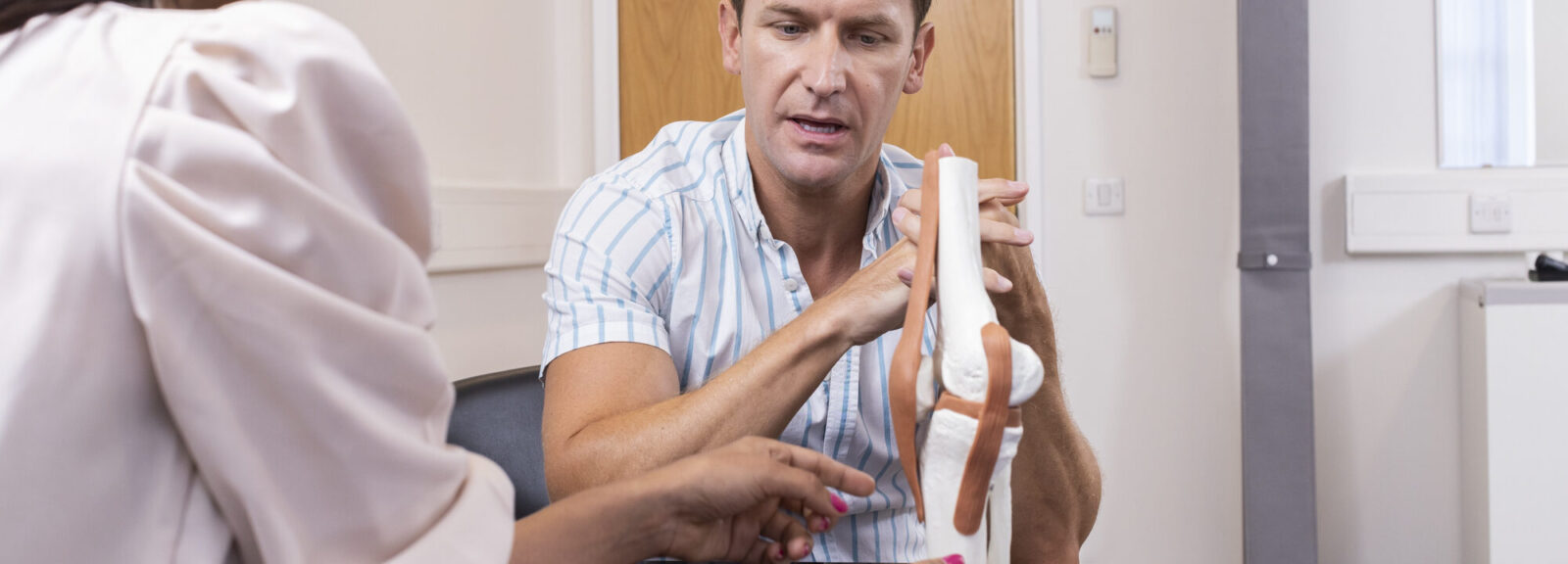Contact number: 020 7806 4060
Meniscal allograft surgery
The menisci are essential structures in the knee, acting as natural shock absorbers and helping to distribute weight evenly across the joint. Meniscus tears can be very common and, in many cases, are not suitable for repair. When symptoms persist, patients often require surgical intervention such as a partial or total meniscectomy (removal of the damaged meniscus tissue). While this can relieve symptoms in the short term, removing part or all of the meniscus can increase the long-term risk of developing knee arthritis.
A meniscal allograft is a transplant using donor tissue to replace a damaged or missing meniscus in the knee. These allografts play a vital role in meniscus transplant surgery, helping to restore joint function, reduce pain, and prevent further damage in patients with severe meniscal loss.
If arthritis symptoms begin to develop following a previous meniscectomy, meniscal replacement surgery using a donor allograft may be considered to help reduce pain, protect the joint, and delay or prevent the need for further surgery such as knee replacement.
Meniscus replacement surgeons
Meniscus transplantation is a highly specialised procedure, performed by only a small number of surgeons in the UK. At St John & St Elizabeth Hospital, this complex surgery is carried out by Professor Ian McDermott who is a leading consultant in the UK for meniscal allograft transplantation.
What's the cost of a meniscal replacement?
£17,995
The price shown includes all hospital related costs associated with your meniscal allograft treatment, from admission to discharge. The price does not include the cost of consultation, diagnostics, or the surgeon or anaesthetist fee.
Our hospital fee is guaranteed at the price quoted and valid for one month from the date issued, subject to pre-assessment.
FAQs about meniscal transplantation
Meniscus transplantation may be suitable if you’ve lost a significant portion, or the entirety, of your meniscus, often following a previous meniscectomy (partial or full removal). If you’re now experiencing persistent knee pain, swelling, or early signs of arthritis, this procedure could help restore joint function and delay further deterioration. It is most commonly recommended for younger, active individuals whose knees are otherwise stable and free from advanced arthritis. To determine if this treatment is right for you, a full clinical assessment including diagnostic imaging and a consultation with one of our specialist orthopaedic surgeons will be required.
No, meniscal transplants do not require tissue typing. Unlike organ transplants, meniscal allografts do not contain living cells that could trigger an immune response. Any residual cellular material is embedded deep within the cartilage matrix, making it inaccessible to the immune system. This means there’s no need for tissue matching, immunosuppressive drugs or steroid medication — anyone can receive a donor meniscus from any suitable donor.
Yes, accurate size matching is essential for a successful meniscus transplant. The donor graft must closely match the size of your natural meniscus to function properly. We typically use specialised X-rays with scale markers to measure the tibial plateau and select the correct graft size from the Tissue Bank, ensuring the best possible outcome.
Meniscus transplantation is a technically advanced surgical procedure, usually performed under general anaesthetic and taking around two hours. If combined with other treatments such as ACL reconstruction or cartilage grafting, the operation may take longer. During the procedure, the donor meniscus is securely fixed to the tibia and stitched to the joint capsule to restore knee stability and cushioning. Most patients stay overnight in hospital and go home the next morning.
Rehabilitation plays a key role in recovery and the long-term success of knee cartilage surgery. For the first six weeks, patients use crutches and wear a hinged brace to limit movement and protect the graft. This is followed by structured physiotherapy, ideally three times per week, to rebuild strength, flexibility and balance. While low-impact activities like cycling can begin early, high-impact movements, twisting, or deep bending should be avoided for at least nine months to allow the graft to heal and integrate fully.
Meniscus transplant surgery has a success rate of approximately 85% at five years, particularly in patients with otherwise healthy knees. Outcomes may vary if there is existing joint damage, arthritis or other structural problems. While not suitable for every case, meniscus transplantation is an effective treatment option for younger patients with ongoing symptoms following meniscus removal, especially for those not ready for a knee replacement.


